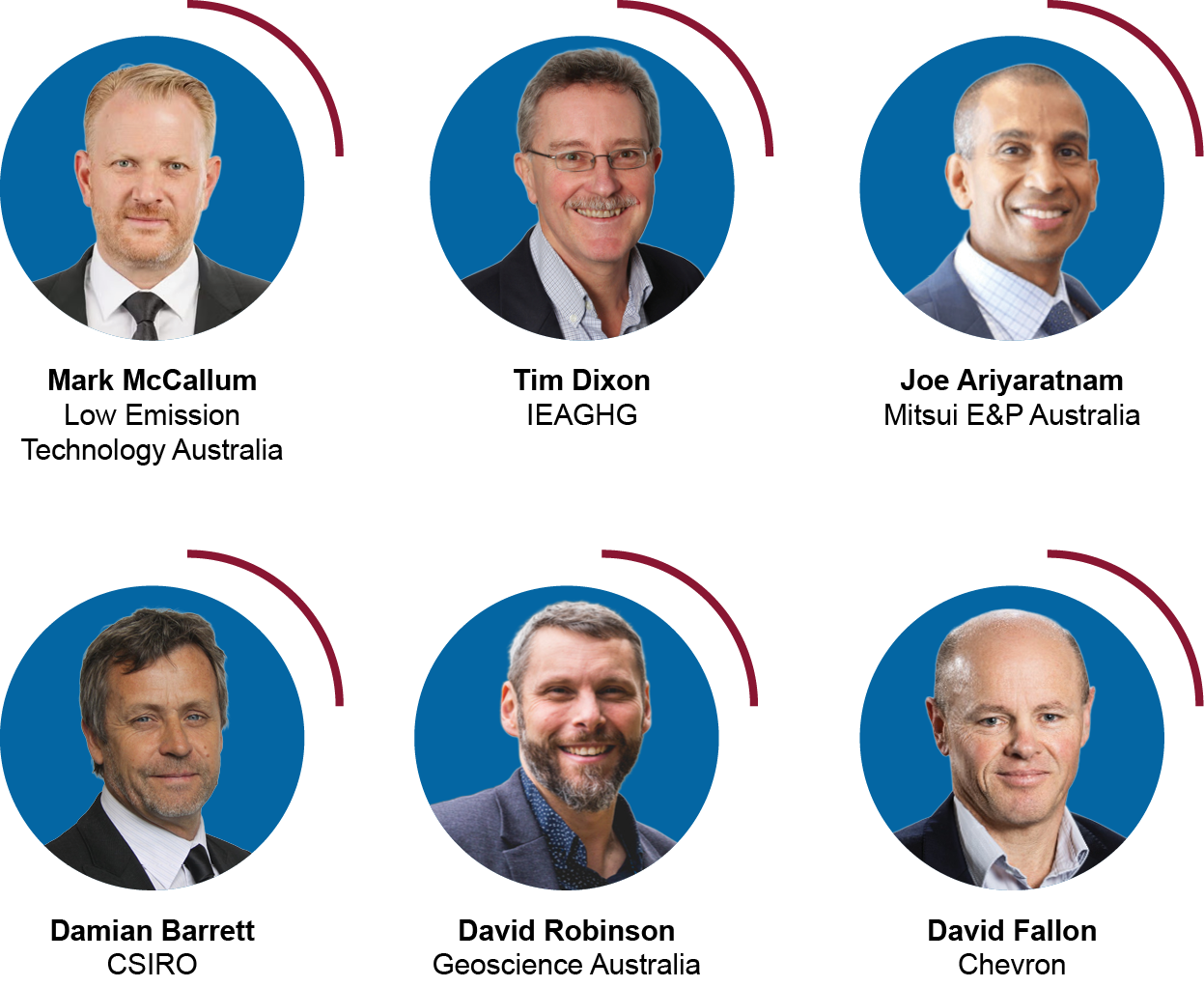
Energy challenges underline that robust emissions reduction needs CCS

Australia’s pathway to meeting its very ambitious emissions reduction targets gets more challenging with every week that passes, and as the cost of energy uncertainty rises by the day.
It is becoming increasingly obvious that carbon capture and storage must be part of any near-term net zero solution. In fact, it can’t be rolled out soon enough if energy security is not compromised in the drive to bring emissions down.
CO2CRC is preparing to play its part with a future works program over the next 10 years that will augment Australia’s ambition to roll out CCS across many more sectors and provide the necessary technology developments to equip the industry with the next generation of technologies it needs. We have aligned twelve of Australia’s preeminent research organisations behind our leadership to drive Australia’s largest, and most needed, CCS research, development and demonstration program.
Cost reduction, operational efficiency and maintaining public confidence are prime among the challenges CCS must meet, and while technology is more needed than ever, the level of support in Australia is lower than ever.
Industry and government must work together to meet all these challenges or Australia will lose its leadership role in this vital technology.
As was clear at the executive committee meetings of the International Energy Agency Greenhouse Gas group in the US last week, the UK, Europe and Asia are all investing heavily in CCS – that includes several projects that have moved into the construction phase or started operations in sectors that had not utilised CCS before. The IEA highlighted this year that the first natural gas power plant with carbon capture and storage has reached FID in the UK, targeting a capture capacity of 2 million tonnes of CO2 per year. A combined heat and power plant in Sweden also reached FID, making it the largest CO2 removal project to cross that milestone.
Meanwhile, a plant in China that started operations last year became the world’s first to capture CO2 emissions from cement production. But Australia, which still boasts two of the world’s largest pure play carbon storage projects at Moomba and Gorgon, has seen investment in new projects slow. Absent more serious support and investment, Australia’s leadership position will be lost – and with it our pathway to net zero.
To reach net zero, we have to deploy all existing technologies, and acknowledge that we will still need technologies that may not even been invented yet. As Australia’s innovation powerhouse, CO2CRC has a critical role in turning this around.
A disciplined roll out of CCS must align with our 2035 and 2050 emissions reduction targets and be consistent with the emissions limitations contained in the Safeguard Mechanism.
We will maintain our research and development work to support industry to make the next wave of investment effective and efficient.
But advocacy also matters. We will maintain our engagement of Federal, State and Territory governments to ensure sound science and commercial reality anchor decisions on carbon abatement.
A series of events in coming weeks provides an opportunity to push the message that CCS is arguably the biggest single enabler of near-term emissions reduction.
Recently in Perth, I attended the APAC Low Carbon Fuels & CCS Summit, where I joined a panel to discuss the key considerations for enabling CCS and cross-border trade in the APAC region. Later this month, our collaboration with Germany and our ability to pilot and upscale new technologies fast will be promoted at an Australian German Chamber of Commerce event at Parliament House in Canberra – and in December, I will travel to Jakarta to deepen bilateral research collaboration with Indonesia.
And in the New Year, our biannual CO2CRC CCS Symposium (23–25 February) in Melbourne will discuss ‘The role of CCS in confronting energy realities’ and explore how technical, economic, policy and political forces are shaping Australia’s contribution to CCS innovation – both at home and on the world stage. we are thrilled the Minister for Resources and Minister for Northern Australia, the Hon Madeleine King MP, will be our keynote speaker. The Minister’s presentation will be followed by a roster of high-calibre national and international speakers ensuring a robust discussion that everyone who is serious about CCS in Australia and the Asia-Pacific should attend. See you there.
Dr Matthias Raab
Chief Executive
Announcing our speaker panel for the 2026 CCS Symposium
We’re bringing together a high-calibre roster of Australian and international voices – industry operators, policy leaders and world-class researchers – to share what’s working on CCS right now, and what needs to happen next across our region.
If you’re serious about CCS in Australia and the Asia–Pacific, don’t miss it.
Registrations now open – early bird savings
As the world races to build clean energy systems, the hard realities of energy supply cannot be ignored. While renewables are accelerating, hydrocarbons remain essential, widespread, and continue to grow in use—driven by the energy demands of expanding, and developing, economies and populations.
Carbon capture and storage (CCS) technologies provide one of the few viable pathways to reduce emissions while preserving energy security and affordability. Yet a widening investment gap threatens to slow progress, with current CCS funding falling well short of what’s needed to keep net-zero ambitions on track. Australia is a key player in closing that gap.
Join us at the CO2CRC CCS Symposium 2026 to explore how technical, economic, policy, and political forces are shaping Australia’s contribution to CCS innovation—both at home and on the world stage. Register now to take advantage of our early bird discounts.
Record carbon credit allocation for Moomba CCS
Congratulations to our Members Santos and Beach Energy in achieving this operational milestone – and thereby demonstrating CCS at scale is possible and that government incentives do deliver results.
CO2CRC’s technical consulting arm, CO2Tech, has been proud to provide the 3rd party technical validation that supported Santos’ submission to the CER and the record-breaking award of ACCU’s to the JV operator. Since our initial engagement with the project during the concept phase, to pre-injection and now ongoing stable operations, we have provided support and expert advice to the Moomba team.
This included:
- Conduct an independent third-party expert review of the Moomba CCS Project – Strzelecki and Marabooka Toolachee Monitoring and Verification Plan (M&V Plan).
- Verify the effectiveness of the M&V Plan and risk-based control measures since first injection and that the M&V Plan is fit for purpose and continues to meet the requirements of the South Australia Moomba Statement of Environmental Objectives: Carbon Storage (SEO).
- Assess and verify the M&V Plan Framework, Containment Risk Assessment and the Effectiveness of Control Measures. To do this CO2Tech, reviewed and verified the M&V Plan and monitoring results through 12 proprietary review criteria within the main elements and concluded that M&V Plan is effective and remains fit-for-purpose at this stage in the life of the project.
- The review also made recommendations for future updates of the M&V plan.
At full injection rates, Moomba CCS stores more CO2e every four days than 10,000 electric vehicles avoid in one year.
We look forward to continuing this support as the recognised CCS Experts in Australia, and to see the Moomba project to continue breaking records!
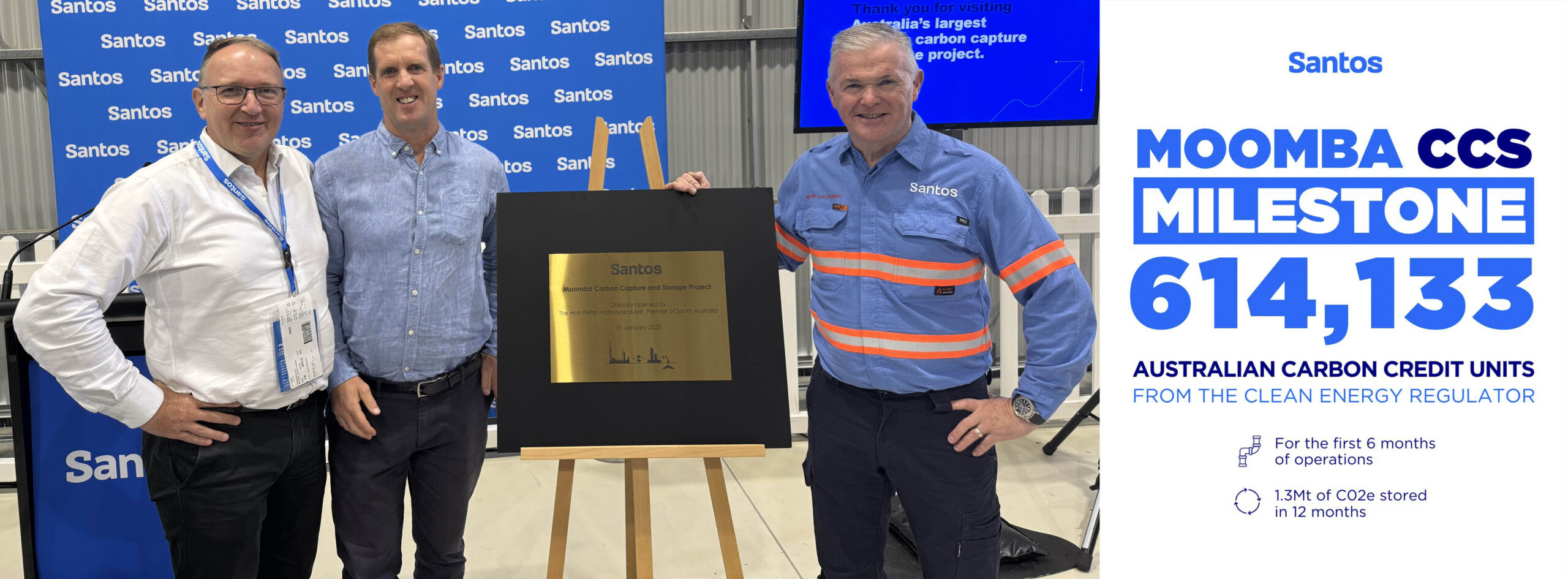
Celebrating Moomba’s milestone: (left) Dr Matthias Raab, CEO CO2CRC and (far right) Mr Kevin Gallagher, MD & CEO Santos, celebrate the official opening of the Moomba CCS project.
CO2Tech’s HyCaps named Top 50 technology at Tencent’s CarbonX Summit
CO2CRC’s technical advisory arm, CO2Tech, has been named to the Tencent’s CarbonX 2.0 Top 50 for its innovative HyCaps (Hybrid Capture Solutions) technology.
CO2Tech joined a global cohort of ClimateTech innovators selected from more than 600 applications around the world to receive the CarbonX Top 50 award on 29 October at Tencent’s headquarters in Shenzhen. The two-day CarbonX Summit brought together finalists, judges, and climate-tech leaders to transition low-carbon solutions from pilot testing to large-scale deployment.
CO2CRC Chief Commercialisation Officer, KS Chan, and Senior Process Engineer, Dr Jai Kant Pandit, attended the summit in Shenzhen, meeting with the esteemed panel of judges, prospective industrial partners and fellow finalists to discuss collaboration and pathways for real-world pilots and scale-up opportunities for HyCaps.
Aligned with Tencent’s “Tech for Good” mission, the CarbonX Program backs emerging climate technologies with catalytic funding and resources to explore, find and scale solutions across carbon dioxide removal (CDR), long-duration energy storage (LDES), and CCUS for steel. Program participants span universities, research institutes and start-ups, with a focus on building first-of-a-kind pilots in real industrial settings and incubating high-potential ventures.
HyCaps, an Australian innovation developed by CO2CRC and Australian research partners, combines solvent absorption and membrane separation in a single process, harnessing the strengths of both technologies to capture CO₂ efficiently while reducing energy requirements. Its modular, scalable design and smaller footprint than conventional amine systems make HyCaps a compelling option for both new and retrofitting to existing plants, accelerating the pace of carbon capture, utilisation and storage (CCUS).
“Being named to the CarbonX Top 50 is a strong endorsement of HyCaps’ readiness to scale up for real-world deployment,” said KS Chan, Chief Commercialisation Officer at CO2CRC. “We’re achieving high capture performance with lower energy use—exactly what industry needs to decarbonise faster with efficient and lower CO2 abatement costs.”
“Tencent’s CarbonX program is about turning bold ideas into industrial pilots,” Chan added. “HyCaps was engineered to be compact and modular so operators can easily retrofit even in existing facilities which has limited space and footprints that practicality can support prototypes to impact.”
“From a process standpoint, HyCaps integrates proven first-generation and second-generation technology unit operations in a way that trims energy penalty and simplifies plant layouts,” said Dr Jai Kant Pandit, Senior Engineer at CO2CRC. “The hybrid and modular design is ideal for steel industries and other hard-to-abate sectors where HyCaps can efficiently capture CO even from multiple and distributed CO2 emission sources. “We’re excited to have this opportunity to present HyCaps technology in Tencent’s CarbonX Program. Our goal is simple: To support decarbonization through reliable CO₂ capture that’s easier to deploy, cheaper to run, and faster to impact.”
In early 2026, a global panel of multi-disciplinary experts will evaluate and select the winning teams to receive grants and other resources to pilot their technologies in those regions and create measurable impact.
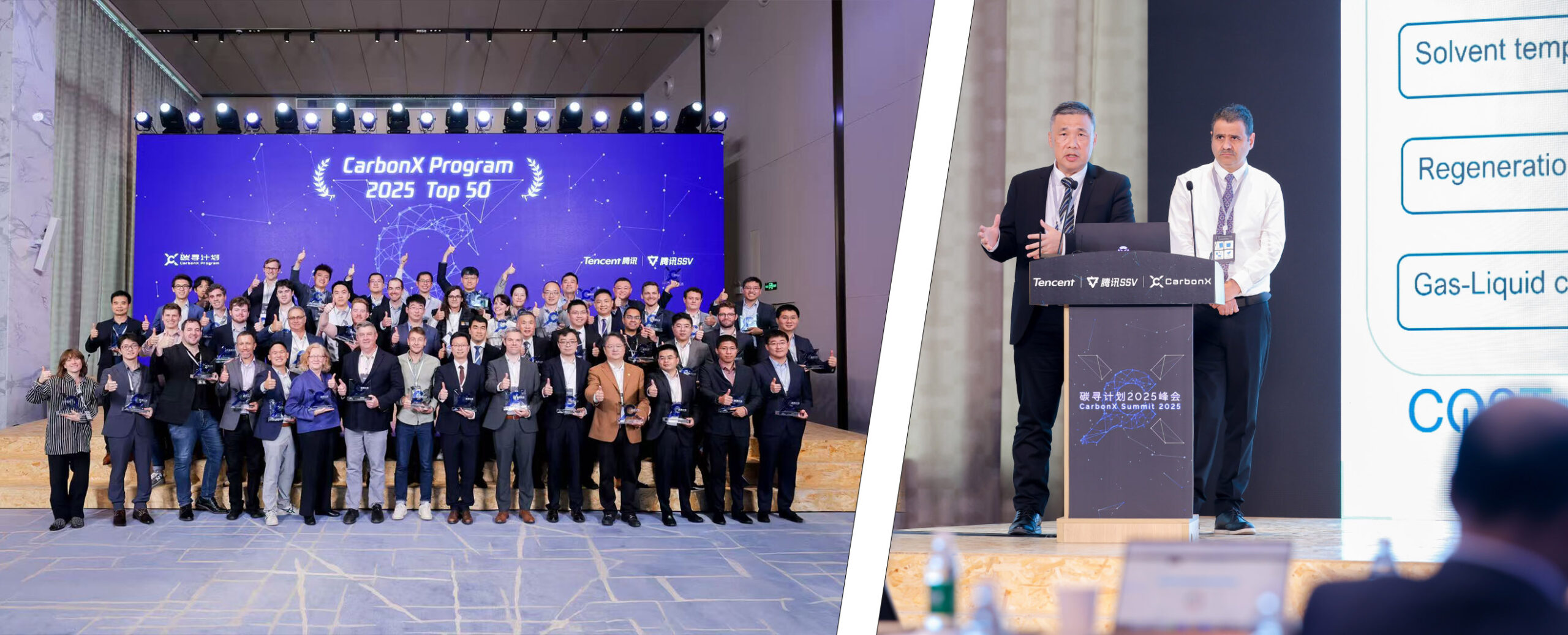
Making CarbonX ‘s 2025 Top 50: KS Chan (second row, sixth from right) with other finalists; and (left), presenting HyCaps on stage with Dr Jai Kant Pandit.
Industry leaders visit OITC to see CCS in action
Following the 2nd Carbon Capture Australia Conference, CO2CRC hosted a delegation of energy and infrastructure professionals at the Otway International Test Centre (OITC), showcasing the research facility’s 20-year history and its role in advancing carbon management technologies.
The group which included Simon McMahon, VP Bonaparte CSS at TotalEnergies, Christine Yip, New Zealand technology and infrastructure advisor, and Dr James Kwame of Lloyd’s Register, were provided with the opportunity to see CCS in action.
CO2CRC’s Business Development Director Paul Barraclough said the visitors were briefed on the OITC’s extensive subsurface infrastructure and current research program, and “left with a strong sense of the scale and sophistication of the work under way and what is planned for the future to support the next generation of CCS projects,“.
“Australia can be a regional leader in carbon management,” Paul Barraclough said to the touring party. “The field-validated data, advanced monitoring and operational efficiencies delivered at the OITC is helping Australia build reliable storage, to accelerate CCS hubs to scale, and lead decarbonisation efforts across the APAC region.”
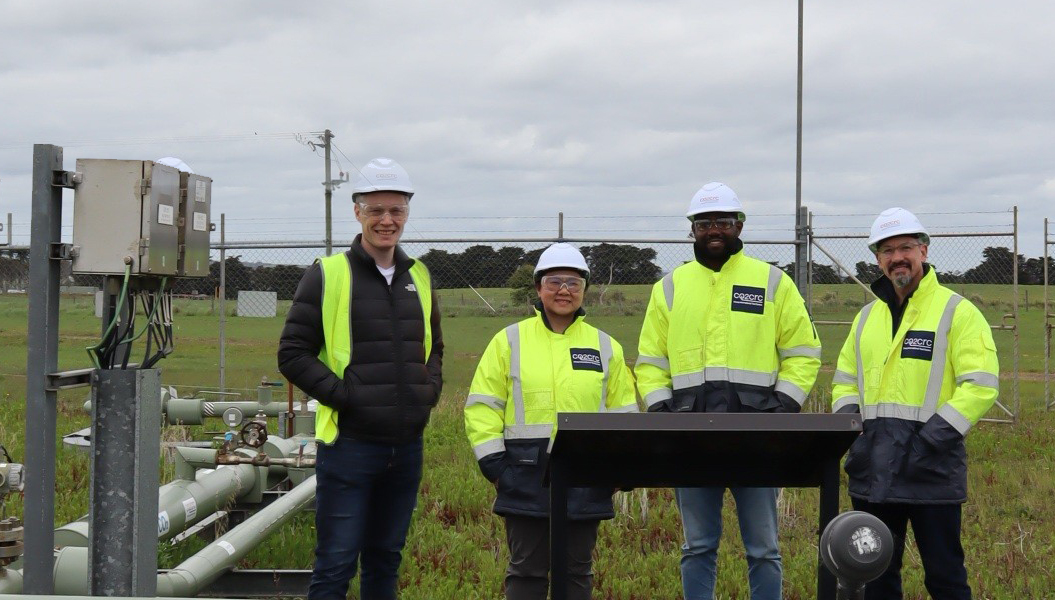
Standing atop a science experiment: Simon McMahon (left),VP Bonaparte CCS – TotalEnergies, Christine Yip, Business Advisor – University of Auckland Engineering and Design, and Dr James Kwame, Senior Manufacturing Technologist – Lloyd’s Register, with CO2CRC’s Business Development Director, Paul Barraclough.
CO2CRC unveils 2026–35 Future Program to build a CCS-ready Australia
CO2CRC’s Future Research Program 2026-2035 is a direct and necessary response to Australia’s legislated climate commitments and economic priorities. It is about providing the proven, practical tools required to secure our nation’s prosperity through the energy transition.
CCS is an essential component of an effective set of solutions for Australia to meet its 2035 and 2050 targets, particularly for safeguard facilities. By investing in this research, Australia can de-risk the pathway to Net Zero, protect the revenue stemming from our critical export industries, and build the sovereign capability to meet Paris Agreement commitments and the Climate Change Act.
Introducing the Keynote Speaker for the 2026 Symposium - The Hon. Madeleine King
We are delighted to announce that the Hon. Madeleine King, Minister for Resources; Minister for Northern Australia, will be our Keynote Speaker at the CO2CRC CCS Symposium 2026.
In a visit to Japan, the Minister highlighted Australia’s “huge potential for CCS,” adding “we have the right geological formations, the right infrastructure, and the right skills to be at the forefront of CCS and to help our regional partners in their own decarbonisation journeys.”
The Minister consistently states there is no pathway to net zero without large-scale carbon capture and storage. CCS is critical for reducing emissions from challenging industrial sectors like manufacturing, particularly in Australia’s resource sector.
Join us in Melbourne on 23–25 February 2026, at Australia’s premier carbon capture and storage event, to hear the Minister’s keynote presentation illustrating the importance of, and her support for, CCS. Note: Minister King’s appearance at the Symposium is subject to parliamentary sitting not clashing with the Symposium held on 23-25 February 2026. Confirmation of Minister King’s appearance will be announced late November 2025.
You can learn more about the 2026 CCS Symposium by clicking here; or learn more about the program by reading the article below.
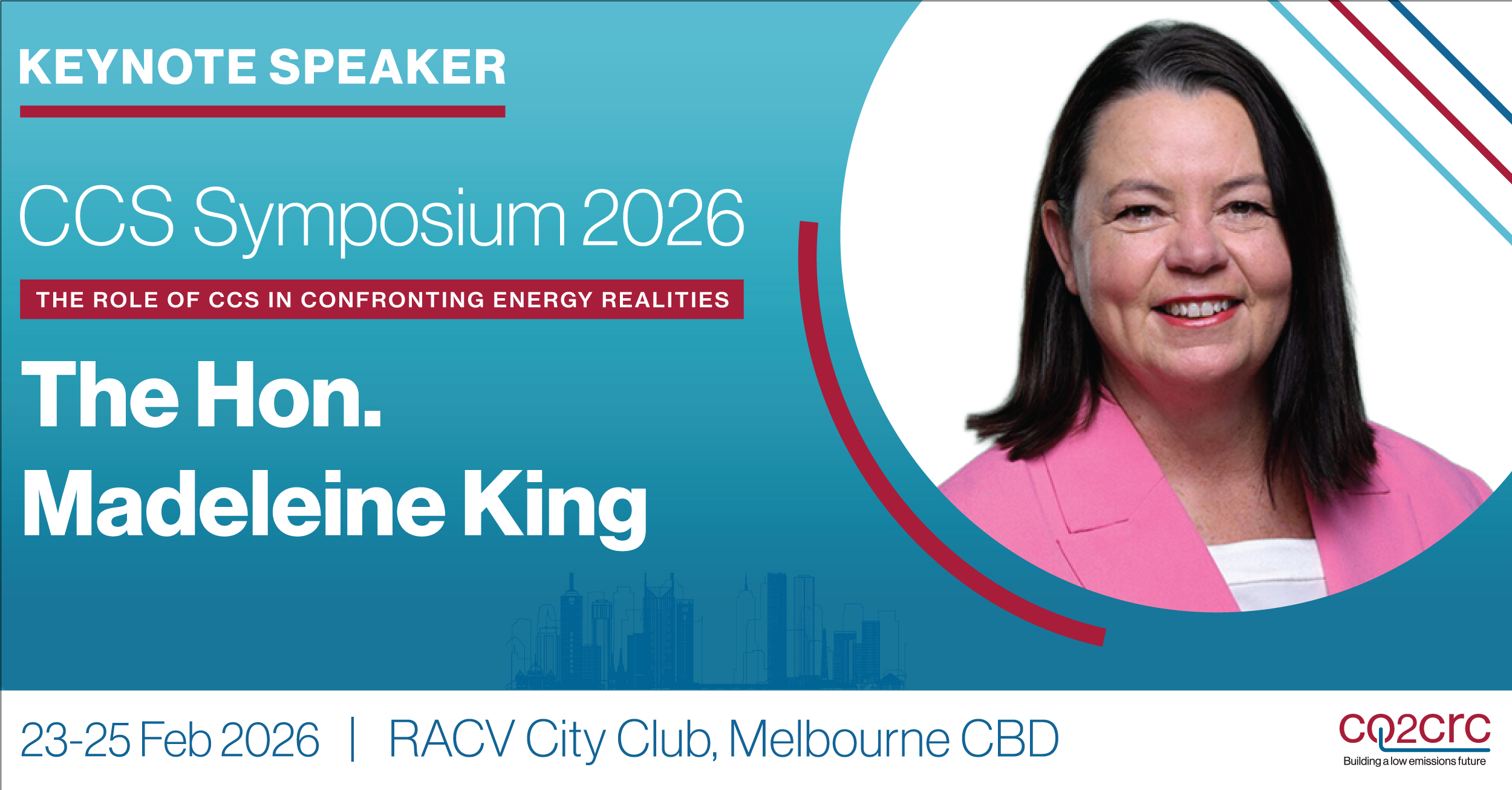
“Australia has huge potential for CCS.” Hear from The Hon. Madeleine King at the CO2CRC CCS Symposium 2026, Melbourne, 23-25 February.
Geoscience Australia rejoins CO2CRC’s research community
CO2CRC are delighted that Geoscience Australia continues as a Research Member of CO2CRC.
Their deep expertise in Australian geoscience will be valuable to our collaborative Future CCS R&D program, alongside our esteemed Australian research partners: CSIRO, Curtin University, and The University of Queensland, with international contributions from Stanford University and the University of Texas, both leaders in CCS Research.
Together, we’re driving innovation in Carbon Management Technologies and advancing Australia’s carbon capture and storage capabilities. Exciting times ahead!
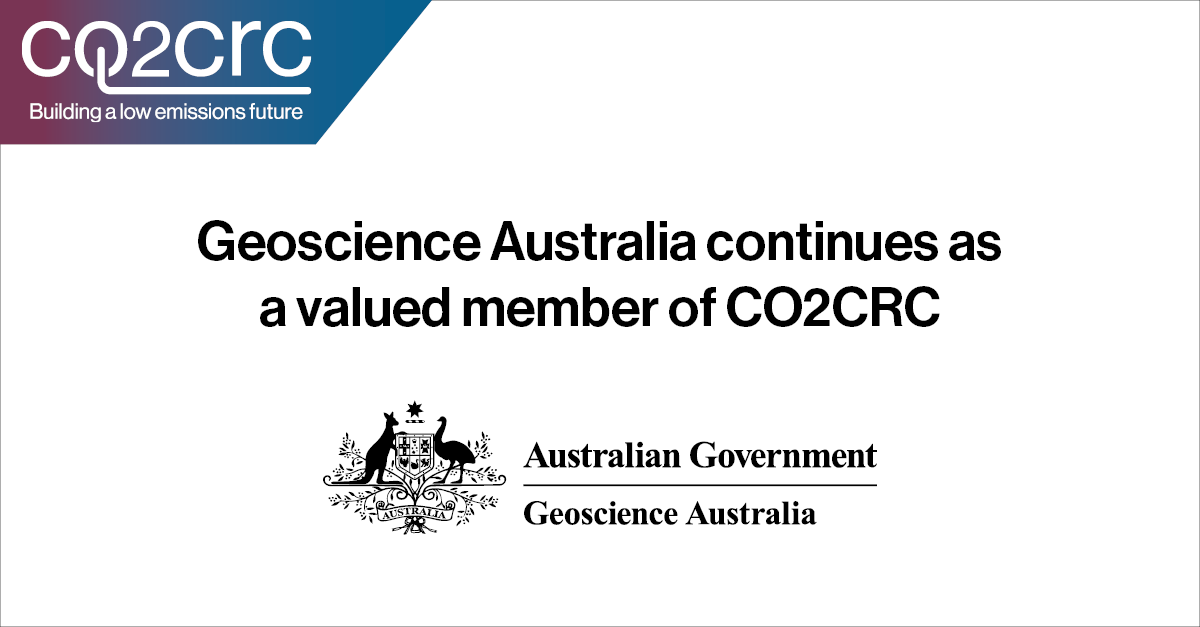
Vital geological expertise: Geoscience Australia continues as a member of CO2CRC.
Symposium technical program spotlights capture breakthroughs and storage at scale
CO2CRC’s 2026 Symposium will examine “The Role of CCS in Confronting Energy Realities,” with a broad, leading-edge, technical program across carbon capture and storage.
The opening capture session, “Advancing Capture: Pathways to Deployment,” will look at new technologies with a focus on advances in direct air capture and other innovations that are moving toward commercial readiness.
Across the program, peer-reviewed technical posters will be paired with a series of flash talks and the opportunity to meet the researchers. The short presentations are designed to highlight key findings and encourage deeper discussion at the posters.
Results from CO2CRC’s GeoCquest Field Validation project will feature, along with other national and international R&D, in two of the storage sessions: “Understanding Scale in Reservoir Characterisation” and “Unlocking New Storage Potential Through Optimisation.” The first will examine how data at different scales informs reservoir properties, plume migration modelling and geochemical interactions. The second will cover improved understanding of CO2 injection behaviour and methods to optimise storage performance and long-term containment.
The “Verifying Storage: Established and Emerging Monitoring,” session will highlighting the role of high-resolution seismic, fibre-optic sensing and geochemical techniques, including outcomes from Otway Stage 4, in building high-confidence monitoring systems. Another technical session; “Deriving Value from Fault Studies and Field Experiments,” will link field-scale research to broader insights on plume behaviour, storage performance and monitoring needs.
Broadening to the energy realities theme, “Australian Onshore CCS: Progress and Perspectives” will profile current and emerging onshore projects and the challenges to deployment. A global view will follow in “Delivering Scalable CO2 Storage for the Energy Transition,” outlining the technical and practical steps needed to achieve storage at the scale required for decarbonisation.
You can view the program for the CCS Symposium 2026 by clicking here.
CO2CRC Training and Education
At CO2CRC, we believe that effective CCUS education and training is a vital element in shaping a sustainable, low-emission future. As such, we are dedicated to equipping a wide array of stakeholders, including industry experts, policymakers, investors, scientists, and the general public, with the knowledge and tools necessary to achieve their emission reduction targets. CO2CRC provides a range of general CCUS educational courses as well as technology specific and tailored CCUS training. Contact Max Watson for more information.

CCS Essentials for Non-technical Professionals
17 November 2025 | online course
This course equips policy, regulatory, and program professionals with a practical understanding of carbon capture and storage (CCS) and its role in delivering on Australia’s climate, energy, and industrial strategies. Designed for non-technical participants, the course focuses on the strategic, economic, regulatory, and environmental dimensions of CCS, supported by real-world case studies and current research.
Delivered online in a workshop-style format, participants are encouraged to engage in open discussion and bring forward the questions, assumptions, or uncertainties that matter most in their roles.
Limit of 30 places available. Secure your spot today:
Contact Max Watson or read for more information.
Follow CO2CRC today on LINKEDIN to keep up to date with the latest news on our ground-breaking demonstration and research projects.
Energy Transition News
27/10/2025 Mitsui joins First Thailand CCS Project – Mitsui and Co Mitsui has joined a CCS project at the Arthit gas field in the Gulf of Thailand.
25/10/2025 Inside Google’s First-of-its-Kind Gas and CCS Energy Project – Sustainability Magazine. Google and Low Carbon Infra have partnered on the 400MW Broadwing Energy facility in Illinois, aiming for a 90% CO₂ capture rate by 2030.
24/10/2025 Veolia Launches Carbon Capture Pilot In France With Eye To U.S. Rollout – Carbon Herald. French firm Veolia is rolling out a pilot carbon capture facility in Le Mans, northwestern France.
24/10/2025 Norway Launches New National CCUS Cluster – Carbon Herald. Norway is forming a new national cluster, CCUS Innovation, which unites two of the country’s leading initiatives, CCUS Norway, led by Carbon Limits, and CCS Innovation, driven by SINTEF Energy.
20/10/2025 CCUS 2025: Collaboration Over Competition Defines UK’s Carbon Capture Push – Carbon Herald. At the CCUS 2025 Conference, the future of CCS didn’t sound just like a tale of pipes and permits—it sounded like a movement.
16/10/2025 Data centre deal to fund Pilot carbon capture play in WA’s Mid West – SMH Pilot Energy and United Arab Emirates-based Kala Data will launch modular data centres at its Arrowsmith production facility in WA’s Perth Basin, aiming to tap quick cash flows to propel its ambitions for the project’s Cliff Head carbon storage transition.
16/10/2025 Louisiana Gov. Landry Pauses New Carbon Capture Projects – Carbon Herald. Louisiana Governor Jeff Landry has issued a temporary moratorium on new CCS well applications, citing the need for greater transparency.
16/10/2025 OGCI Launches Global Tracker For CO2 Storage Licenses – Carbon Herald The Oil and Gas Climate Initiative has unveiled an online CO2 Storage Licence Tracker, a tool designed to centralize and visualize data on carbon dioxide storage permits across key markets.
13/10/2025 Qatar Energy to produce CCS – World Fertilizer. State-owned ammonia producer Qatar Energy could commission its ammonia plant with CCS in April 2026, with initial output of 900 000 tpy.
13/10/2025 UK Carbon Capture and Storage Market to Hit USD 3.52 Billion by 2035, Driven by CCS Clusters and Blue Hydrogen – FMI Blog. The UK CCS market is projected to reach a valuation of USD 3,524.9 million by 2035, growing at a strong CAGR of 16.1% from 2025 to 2035.
13/10/2025 Nordbex And Aker Solutions To Deliver Sweden’s First Replicable Bio-CCUS Facility – Carbon Herald Nordbex and Aker Solutions have signed MoU to expand their collaboration and accelerate the rollout of Bio-CCUS projects across Europe.
13/10/2025 California Moves Forward With Carbon Pipelines Law, Doubles Down On CO2 Capture And Removal – Carbon Herald California is positioning itself at the forefront of carbon management technology with a new law.
11/10/2025 Ministry aims to store 6 million tonnes of carbon – Taipei Times work together: Taiwan and Japan have opportunities to cooperate in CCS development.
10/10/2025 Global Status Of CCS 2025: Industry Stays The Course Toward Gigaton Scale – Carbon Herald. The Global CCS Institute’s 2025 flagship report, Staying the Course, finds that the technology is advancing steadily toward gigaton-scale deployment.
09/10/2025 Opportunities for Knowledge Exchange between Finland and Malaysia on CCS – Bernama. Finland’s expertise in waste to energy and Malaysia’s existing CCS capacity present opportunities for knowledge exchange in CCS.
06/10/2025 U.S. DOE Axes $7.6B Worth Of Awards, Affecting 223 Climate-Related Projects – Carbon Herald. The U.S. DOE has announced that it is cancelling $7.56 billion dollars’ worth of awards, which were intended to support 223 climate- and energy-related projects across the country.
06/10/2025 Germany Launches $7B Industrial Decarbonization Program Integrating CCS – ESG News. Germany has announced a €6 billion funding program to help heavy industry cut emissions through new climate protection contracts incorporating CCS.
06/10/2025 CCS plan could raise emissions by 25bn tonnes – Asia Insurance Review. Asian countries, that are considering CCS plan to address fossil fuel emissions could create a “considerable and unnecessary risk”
03/10/2025 Peak Cluster Taps Arup For Largest Cement Decarbonization Scheme – Carbon Herald. Arup has been appointed as lead consultant on the Peak Cluster project, an ambitious initiative to decarbonize the UK’s cement and lime sector.
Subscribe
Know a friend or colleague who would be interested in CO2CRC’s Insights Newsletter?
Tell them to subscribe below
